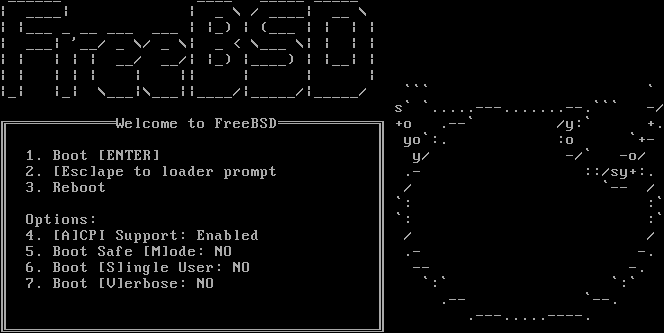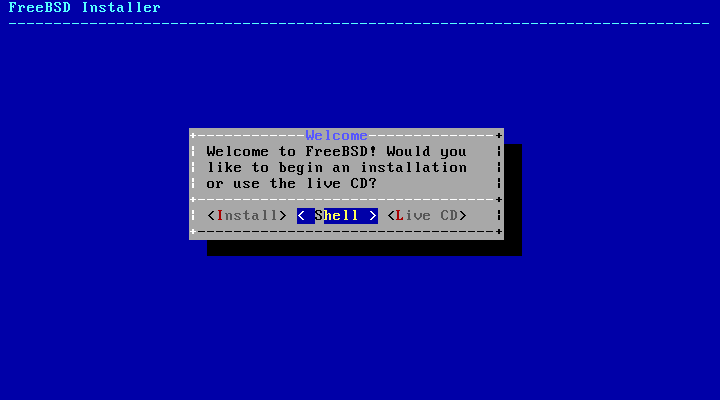ZFS root fs on FreeBSD 9.0
Gone are the old MFS root fs image and the sysinstall utility. To create a useable ZFS root fs from the 9.0-RELEASE DVD we must specify an alternate location for the temporary zpool.cache file and an alternate mountpoint for the ZFS root fs by using a command like:
zpool create -o cachefile=/tmp/zpool.cache -m /tmp/zroot zroot /dev/gpt/disk0
Also, the FreeBSD distribution is now stored as a handful of xz compressed tar files in /usr/freebsd-dist on the DVD. Everything else remain largely the same. The instructions below also apply to 9.1-RELEASE.
See http://wiki.freebsd.org/RootOnZFS/GPTZFSBoot and http://www.aisecure.net/2011/05/01/root-on-zfs-freebsd-current/ for further details.
Keep on reading if you want my recipe for creating a ZFS root fs.
- Boot from the FreeBSD 9.0-RELEASE DVD. You may choose the AMD64 or the i386 ISO file. You may choose the FreeBSD 9.1-RELEASE DVD, either AMD64 or i386.
- Interrupt the FreeBSD boot loader by pressing the escape key.
- Issue the following commands, adjust to taste if necessary:
load opensolaris load zfs boot
- Choose Shell by hitting the right arrow and the enter keys.
- Assuming you want to use GPT partition scheme, issue these commands, adjust to taste if necessary:
gpart create -s gpt ada0 gpart add -s 64K -t freebsd-boot ada0 gpart add -s 4G -t freebsd-swap -l swap0 ada0 gpart add -t freebsd-zfs -l disk0 ada0 gpart bootcode -b /boot/pmbr -p /boot/gptzfsboot -i 1 ada0
- Create the root pool and populate the pool with the required and other file systems as you see fit:
zpool create -o cachefile=/tmp/zpool.cache -m /tmp/zroot zroot /dev/gpt/disk0 zpool set bootfs=zroot zroot zfs set checksum=fletcher4 zroot zfs create -o setuid=off zroot/home zfs create -o compression=on -o exec=on -o setuid=off zroot/tmp chmod 1777 /tmp/zroot/tmp zfs create zroot/usr zfs create zroot/usr/compat ln -s usr/compat /tmp/zroot/compat mkdir -p /tmp/zroot/compat/linux/proc zfs create zroot/usr/local zfs create -o compression=lzjb -o exec=off -o setuid=off zroot/usr/local/certs zfs create -o compression=lzjb -o exec=on -o setuid=off zroot/usr/local/etc zfs create zroot/usr/local/www zfs create zroot/usr/obj zfs create -o exec=off -o setuid=off zroot/usr/packages zfs create -o compression=lzjb -o exec=on -o setuid=off zroot/usr/ports zfs create -o compression=off -o exec=off -o setuid=off zroot/usr/ports/distfiles zfs create -o compression=off -o exec=off -o setuid=off zroot/usr/ports/packages zfs create -o compression=off -o exec=on -o setuid=off zroot/usr/ports/workdirs zfs create -o compression=lzjb -o exec=off -o setuid=off zroot/usr/src zfs create zroot/var zfs create -o compression=lzjb -o exec=off -o setuid=off zroot/var/crash zfs create -o exec=off -o setuid=off zroot/var/db zfs create -o compression=lzjb -o exec=on -o setuid=off zroot/var/db/pkg zfs create -o compression=lzjb -o exec=on -o setuid=off zroot/var/db/ports zfs create -o compression=lzjb -o exec=off -o setuid=off zroot/var/db/sup zfs create -o exec=off -o setuid=off zroot/var/empty zfs create -o compression=lzjb -o exec=off -o setuid=off zroot/var/log zfs create -o compression=gzip-9 -o exec=off -o setuid=off zroot/var/mail zfs create -o exec=off -o setuid=off zroot/var/run zfs create -o compression=lzjb -o exec=on -o setuid=off zroot/var/tmp chmod 1777 /tmp/zroot/var/tmp
- It might be a Good Thing™ to reserve some of the storage capacity for the root fs by setting the
refreservationproperty. This property won’t propagate to the child filesystems. 10G might be sufficient for your needs or else take your pick:zfs set refreservation=10G zroot
- Change the working directory to
/tmp/zrootand extract the necessary tar files:cd /tmp/zroot tar xvvf /usr/freebsd-dist/kernel.txz tar xvvf /usr/freebsd-dist/base.txz tar xvvf /usr/freebsd-dist/lib32.txz # Only on AMD64.
- Write protect
/var/empty:zfs set readonly=on zroot/var/empty
- Copy the
zpool.cachefile to the ZFS root fs:cp -p /tmp/zpool.cache /tmp/zroot/boot/zfs/zpool.cache
chrootinto the new root fs:chroot /tmp/zroot set -E
- Create separate mountpoints for CDs (ISO 9660) and DVDs (UDF), as FreeBSD lacks autofs:
mkdir /media/cdrom mkdir /media/dvdrom
- Create a minimal
/etc/fstabfile, adjust the following to taste:# Device Mountpoint FStype Options Dump Pass# /dev/gpt/swap0 none swap sw 0 0 /dev/cd0 /media/cdrom cd9660 ro,noauto 0 0 /dev/cd0 /media/dvdrom udf ro,noauto 0 0 proc /proc procfs rw,late 0 0 linproc /compat/linux/proc linprocfs rw,late 0 0
- Create a minimal
/etc/rc.conffile, adjust the following to taste:zfs_enable="YES" background_fsck="NO" hostname="zfstest.example.org" ifconfig_em0="DHCP" ipv6_activate_all_interfaces="YES" keymap="norwegian.iso" keyrate="fast" keybell="off" font8x16="iso-8x16" font8x14="iso-8x14" font8x8="iso-8x8" dumpdev="/dev/gpt/swap0"
- If you decide not to use DHCP, then create a
/etc/resolv.conffile and adjust the contents of this file to fit your environment:search example.org nameserver 2001:db8:1234:1::2 nameserver 2001:db8:1234:1::3 nameserver 192.0.2.2
- Create a minimal
/boot/loader.conf, adjust the following to taste:zfs_load="YES" vfs.root.mountfrom="zfs:zroot"
Update 2013-07-21: Newer versions of
{,gpt}zfsbootare able to compute the correct value forvfs.root.mountfrombased on thebootfszpool attribute. Simply avoid setting a value forvfs.root.mountfromin/boot/loader.conf. - It might make sense to store the workdirs for the ports hierarchy in a filesystem without any compression being applied, so create a minimal
/etc/make.conf, adjust the following to taste:WRKDIRPREFIX=/usr/ports/workdirs
- Set root’s password (and optionally toor’s password):
passwd root passwd toor
- Set the time zone:
tzsetup
- Create the
/etc/mail/aliases.dbfile:cd /etc/mail make aliases
- Leave the
chrootenvironment:exit
- Unmount the ZFS file systems:
cd / zfs unmount -a
- Set the final mountpoints:
zfs set mountpoint=legacy zroot zfs set mountpoint=/home zroot/home zfs set mountpoint=/tmp zroot/tmp zfs set mountpoint=/usr zroot/usr zfs set mountpoint=/var zroot/var
- Unmount the ZFS file systems once more:
zfs unmount -a
- Reboot the system, unload the DVD, and cross your fingers:
reboot- Unload DVD.
- Cross fingers.


